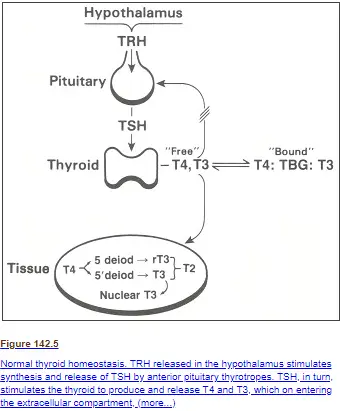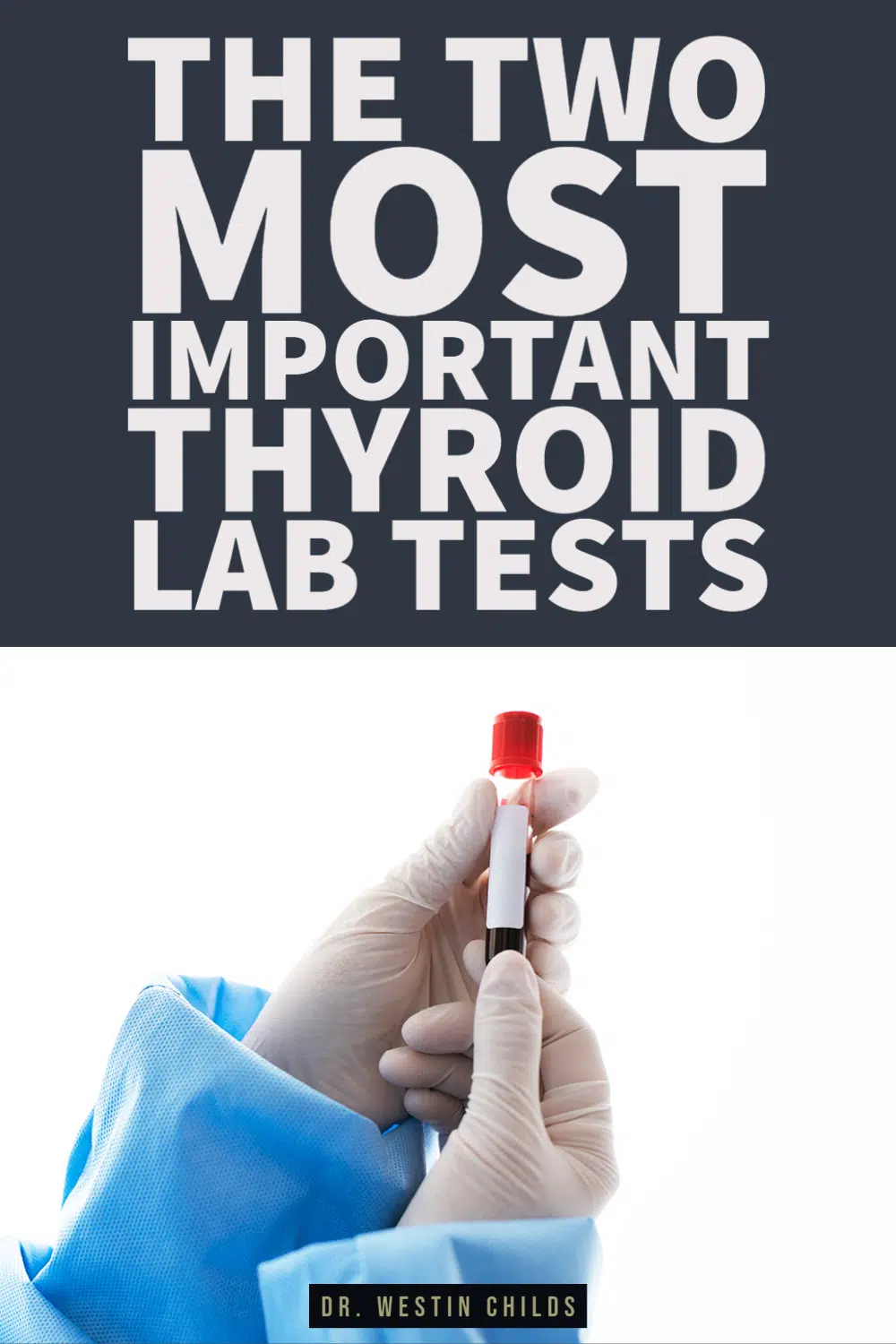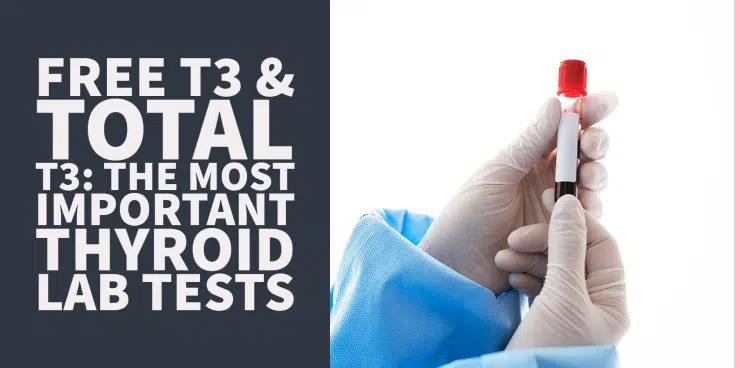The free T3 and total T3 lab tests are among the most important for evaluating thyroid function in your body.
These tests give vital information as to how your body is processing thyroid hormones.
And they give you information about the hormone which is responsible for activating your cells and turning on your genes.
These basic levels can be assessed and used in conjunction with other thyroid lab tests to give you a very clear picture of thyroid function in your body.
This post will teach you everything you need to know about free T3 as a lab test and how to understand your levels…
What Does Free T3 Tell You About your Thyroid?
There are many ways to assess thyroid function in your body and many different lab tests.
You are probably already familiar with TSH or thyroid stimulating hormone.
This lab test gives you an idea as to how responsive your thyroid is to your brain and if that connection is working properly.
But what does free T3 tell you about your thyroid?
Free T3 gives you an idea of how ACTIVE your thyroid is at the cellular level. (1)
The measurement of free T3 is telling you how much free and active thyroid hormone your body is available to work with.

Free T3, after all, is the single most important thyroid hormone in your body.
It’s the hormone that is responsible for attaching to the surface and the nucleus of your cells and making genetic changes to those cells.
This simple process is what makes your thyroid increase your energy, manage your weight, regulate your cycle, and so on.
But what happens if you don’t have a sufficient amount of free T3 in your body?
You WILL experience the symptoms of hypothyroidism.
Why?
Because free T3 does all of the heavy liftings when it comes to your thyroid. (2)
If you aren’t familiar with the thyroid conversion process or why it’s so important for your body to go through this process please see this short video below which will bring you up to speed:
DOWNLOAD FREE RESOURCES
Foods to Avoid if you Have Thyroid Problems:
I’ve found that these 10 foods cause the most problems for thyroid patients. Learn which foods you should avoid if you have thyroid disease of any type.
The Complete List of Thyroid Lab tests:
The list includes optimal ranges, normal ranges, and the complete list of tests you need to diagnose and manage thyroid disease correctly!
TSH vs Free T3, Total T3 & Free F4
Like most people, you are probably more familiar with TSH as a marker for testing your thyroid.
And you wouldn’t be alone in this understanding because Doctors also love to use this test.
But is it the single best test to assess thyroid function in your body? Did you know that there are many other thyroid function tests?
The answer may surprise you.
It turns out that in healthy individuals TSH is probably a great way to assess thyroid function in the body.
It’s also probably the best way to quickly glance at thyroid function, through lab tests, to determine if the thyroid is “normal”. (3)
But where it fails is when you use it as the only source to help manage patients who are already taking thyroid medication.
We know, from recent studies, that TSH fails to predict free T3 and free T4 levels in patients who are taking thyroid medication. (4)
That’s important, but what exactly does it mean?
It means that if you are taking thyroid medication (such as Levothyroxine or Synthroid) that you may have a completely normal TSH, but that doesn’t mean that your free thyroid hormone levels are “normal”.
This may explain why many patients on these types of medications don’t feel optimal despite having “normal” thyroid levels.
That’s where free T3 steps in.
Free T3 can, and should, be used in conjunction with the TSH to ensure that you are getting a sufficient amount of ACTIVE thyroid hormone to your cells.
And this way of looking at hormones shouldn’t be surprising to you or Doctors.
Why?
Because for virtually all other hormone levels in the body, we ALWAYS check for the active hormone!
If I asked you if your testosterone was “normal” wouldn’t you actually want to know how much testosterone is floating around in your blood? (5)
Well, the TSH is NOT that marker.
The TSH is a proxy marker for how well the pituitary is functioning but it does NOT tell you how much hormone is in the body.
When you break it down in this way it just becomes obvious that we would want to look at the active thyroid hormone (free T3 and free T4) but this logic is lost on many patients and doctors.
Avoid falling into this trap! The free T3 can give you seriously helpful information about how your thyroid is functioning.
Optimal Ranges for Free (What’s a “Normal” Range?)
But what is a “normal” or “healthy” range? What levels should you look for when you test for this simple lab test?
This is a simple yet very important question.
The answer is that it varies based on which lab company is drawing and running your bloodwork.
And that happens for this reason:
Each lab company creates its own “reference ranges” that your result is compared to.
These reference ranges are based on the results of other people local to your area. (6)
And they often include people of ALL ages and of varying health statuses.

That means the reference range is compiled of a bunch of both healthy and unhealthy people which can skew the range.
When you look at your results you want to be compared to HEALTHY individuals who are around your same age.
You don’t want to be compared to someone who is in their 80s with multiple health conditions.
So how do you do this?
By looking at the reference range and ensuring that your result falls within the top 50% percentile of that reference range.
This isn’t a perfect way to do it, but it is much better than potentially comparing yourself to unhealthy people.
Let’s use this as an example:

This example shows a free T3 of 2.3 with a reference range of 1.7 to 3.7.
If we break down the difference between 3.7 and 1.7 we get 2.0.
That means that the top 50% of the “healthy” range is between 2.7 and 3.7 (3.7 being the top end of the healthy range).
That also means that the bottom 50% of the “less optimal” range is between 1.7 and 2.7 (1.7 being the bottom end of that range based on the reference range).
So you want your result to ideally fall between 2.7 and 3.7 (in this example!).
You can apply this same methodology to your lab test.
Is having a High Free T3 Dangerous? (Symptoms of High Free T3)
Just like having a low free T3 is potentially dangerous so is having a high free T3. (7)
In a perfect world, you want your lab test in just the “perfect” zone (the top 50% of the reference range listed above).
What you will find, however, is that your free T3 will vary based on when you take your thyroid medication, (8) the type of thyroid medication you are taking, and when you check your blood work.
To prevent abnormalities in your blood work you will want to follow these basic rules:
#1. Make sure to test your blood work about 24 hours after you take your thyroid medication.
This will help prevent abnormal highs when testing.
You want to look at the lowest level of thyroid hormone that is in your body prior to your next dose.
Checking at hour 24 (assuming you take your thyroid medication every 24 hours) will show you the lowest that your free T3 will be right before you take your medication.
If this value is in the 50% of the reference range then you know that throughout the day you are maintaining at least that level.
#2. Don’t check your blood work right after you take your thyroid medication.
This will give you a value that is falsely elevated and not indicative of what your levels will be throughout the day.
If you still have a high free T3, despite following these rules, then you might be in danger of taking too much thyroid hormone.
If you do, you will most likely notice it as you become symptomatic.
Symptoms that may accompany a high-free T3 include:
- Jittery sensation
- Heart palpitations
- Sweating
- Hot flashes
- Tremors of the hands
- Diarrhea
- Anxiety
- Rapid heart rate
If you are experiencing any of these symptoms and you have a high free T3 then you may need to adjust your dose.
Symptoms of Low Free T3
Perhaps more common than high free T3 is the condition of having a low free T3.
Most people, due to a variety of reasons, tend to be undertreated as opposed to overtreated.
Undertreatment of hypothyroidism usually results in low free T3 levels which can be identified when these levels are in the bottom 50% of the reference range (see example above).
Symptoms associated with this condition often mimic those associated with hypothyroidism. (9)
Why?
Because free T3 is the hormone responsible for all of the benefits of thyroid hormone.
So it makes sense that low levels may result in these symptoms.
Symptoms of low free T3 include:
- Weight gain
- Fatigue
- Constipation
- Cold intolerance
- Slow heart rate
- Lower than normal body temperature
- Brain fog
- Depression
- Menstrual problems
If you have these symptoms and low free T3 on lab testing then you may need to make adjustments to your medication regimen.
This may include using supplements or medications designed to help improve your free T3.
What to do to Raise your Free T3 (Medications + Supplements)
There are two main ways that you can improve your free T3.
The first is through the use of medications and the second is through the use of targeted supplements.
Let’s discuss medications first:
Low-free T3 when you are already taking thyroid medication is usually an indication that your body is having trouble activating the thyroid hormone.
In addition, it may be a sign that you are either not absorbing your medication or that your dose is not high enough.
Either way, you may need to make changes to your medication regimen.
The easiest way to increase T3 levels is by adding medications that contain this hormone. (10)
Medications such as liothyronine and Cytomel can be added to your regimen which will directly increase T3 levels.
The problem with this approach is that it requires your Doctor to be on board.
It can be difficult to convince a physician to provide these medications as they are usually not comfortable using them (even though they are safe!).
If you fall into this category then you may need to take the supplement route:
Certain supplements, available over the counter, can be used to help improve thyroid function and thyroid conversion.
These supplements may help your body by providing the necessary vitamins and nutrients involved in the thyroid conversion process.
My personal recommendation is to use a supplement such as this which contains zinc, selenium, vitamin A, and guggul, all of which are designed to help this process.
The great thing about supplements is that they can be combined with thyroid medications, they are easy to get, and may help a great many people.
Conclusion
Hopefully, you appreciate the value that testing free T3 can give you when looking at your thyroid.
Free T3 is available as an easy and routine blood test that is covered by all insurance (I’ve ordered it thousands of times and have never had an issue so don’t buy that excuse!).
Testing your free T3 will help you to understand if your body activating thyroid hormone in your body and should be used in conjunction with other lab tests such as TSH and free T4.
Whenever you make any changes to your treatment regimen make sure that you test afterward!
This will help guide your treatment and help you to know what is working and what isn’t.
Now I want to hear from you:
Have you tested your free T3?
Do you know if you have a low-free T3 or a high-free T3?
Do you feel that your body is converting or activating your thyroid hormone?
Why or why not?
Leave your comments or questions below and I will do my best to answer!








